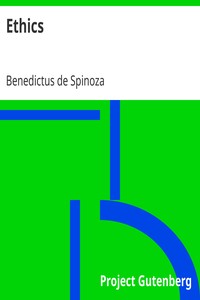Ethics by Benedictus de Spinoza
"Ethics" by Benedictus de Spinoza is a philosophical treatise written in the mid-17th century. The work systematically examines the nature of reality, the existence of God, and the interplay between nature and human thought. It seeks to establish a framework for understanding ethics through a geometric method, aiming for clarity and logical rigor. The beginning of "Ethics" introduces foundational concepts and definitions fundamental to Spinoza's philosophy. He defines substance, attributes, modes, and
the nature of God, emphasizing that God is an absolutely infinite being whose essence includes existence. Spinoza outlines key propositions that explore the implications of substances and their modifications, ultimately arguing for a singular framework in which everything exists in God. This introductory section sets the stage for a more detailed exploration of the mind, human emotion, and the essence of existence, promising an intricate argumentation that intertwines metaphysics and ethics. (This is an automatically generated summary.)
Read now or download (free!)
| Choose how to read this book | Url | Size | ||||
|---|---|---|---|---|---|---|
| Read online (web) | https://www.gutenberg.org/ebooks/3800.html.images | 543 kB | ||||
| EPUB3 (E-readers incl. Send-to-Kindle) | https://www.gutenberg.org/ebooks/3800.epub3.images | 225 kB | ||||
| EPUB (no images, older E-readers) | https://www.gutenberg.org/ebooks/3800.epub.noimages | 232 kB | ||||
| Kindle | https://www.gutenberg.org/ebooks/3800.kf8.images | 395 kB | ||||
| older Kindles | https://www.gutenberg.org/ebooks/3800.kindle.images | 377 kB | ||||
| Plain Text UTF-8 | https://www.gutenberg.org/ebooks/3800.txt.utf-8 | 519 kB | ||||
| Download HTML (zip) | https://www.gutenberg.org/cache/epub/3800/pg3800-h.zip | 217 kB | ||||
| There may be more files related to this item. | ||||||
About this eBook
| Author | Spinoza, Benedictus de, 1632-1677 |
|---|---|
| Translator | Elwes, R. H. M. (Robert Harvey Monro), 1853- |
| Uniform Title | Ethica. English |
| Title | Ethics |
| Alternate Title | Ethica Ordine Geometrico Demonstrata |
| Note | Reading ease score: 62.7 (8th & 9th grade). Neither easy nor difficult to read. |
| Note | Wikipedia page about this book: https://en.wikipedia.org/wiki/Ethics_(Spinoza_book) |
| Credits | Produced by Tom Sharpe. HTML version by Al Haines. |
| Language | English |
| LoC Class | B: Philosophy, Psychology, Religion |
| Subject | Ethics |
| Category | Text |
| EBook-No. | 3800 |
| Release Date | Feb 1, 2003 |
| Most Recently Updated | Jan 9, 2021 |
| Copyright Status | Public domain in the USA. |
| Downloads | 6621 downloads in the last 30 days. |
| Project Gutenberg eBooks are always free! | |

